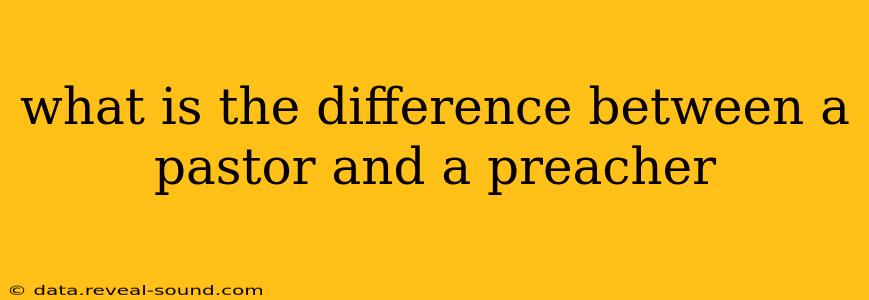What's the Difference Between a Pastor and a Preacher?
The terms "pastor" and "preacher" are often used interchangeably, leading to confusion. While both roles involve leading and guiding a congregation, there are key distinctions in their responsibilities and approaches. Understanding these differences helps clarify the roles within various Christian denominations and traditions.
What does a preacher do?
A preacher's primary function is preaching sermons. Their focus is on delivering powerful and inspiring messages based on biblical texts. They interpret scripture, apply it to contemporary life, and aim to move their audience spiritually. While some preachers may also hold pastoral responsibilities, the core of their role centers around sermon preparation and delivery. The emphasis is on proclamation of the Gospel. Think of a traveling evangelist or revivalist—their role is largely preaching.
What does a pastor do?
A pastor's role is broader and encompasses shepherding a congregation. While preaching is certainly a significant part of their job, it's only one aspect of their overall responsibilities. Pastors are responsible for the spiritual well-being of their flock. This includes:
- Providing spiritual guidance and counseling: Offering support, advice, and prayer to individuals and families within the church.
- Leading worship services: Not just preaching, but overseeing the entire service, including music, prayer, and other elements.
- Community building: Fostering relationships and a sense of community among church members.
- Administration and management: Handling church finances, organizing events, and overseeing various ministries within the church.
- Visitation and pastoral care: Visiting sick or grieving members, offering comfort and support during difficult times.
Essentially, a pastor is a shepherd who cares for the spiritual and often emotional needs of his or her congregation.
What are the key differences summarized?
| Feature | Preacher | Pastor |
|---|---|---|
| Primary Role | Preaching sermons | Shepherding a congregation |
| Focus | Proclamation of the Gospel | Spiritual well-being and community building |
| Responsibilities | Primarily sermon preparation & delivery | Preaching, counseling, administration, etc. |
| Scope | Can be broader or narrower | Generally broader and more encompassing |
Are the roles mutually exclusive?
No, the roles aren't mutually exclusive. Many pastors are also excellent preachers. In fact, strong preaching is often a key component of effective pastoral leadership. However, the reverse isn't always true. A preacher may not have the pastoral training or inclination to manage a congregation and provide the comprehensive care that a pastor offers.
How do denominations view these roles?
The specific understanding and application of "pastor" and "preacher" can vary across different Christian denominations. Some denominations may use the terms interchangeably, while others have distinct roles with different titles.
In essence, while both roles involve serving God and the church, the pastor's role is much more holistic and encompassing, focusing on the overall well-being of the congregation, while the preacher's role centers primarily on the act of delivering sermons.
